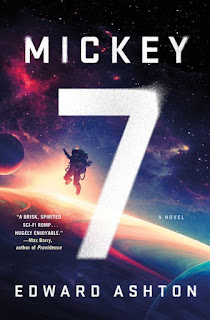 ranging from the newsletter of an Italian sausage company to Escape Pod, Analog, and Fireside Fiction. He lives in upstate New York in a cabin in the woods (not that Cabin in the Woods) with his wife, a variable number of daughters, and an adorably mopey dog named Max, where he writes—mostly fiction, occasionally fact—under the watchful eyes of a giant woodpecker and a rotating cast of barred owls. In his free time, he enjoys cancer research, teaching quantum physics to sullen graduate students, and whittling.
ranging from the newsletter of an Italian sausage company to Escape Pod, Analog, and Fireside Fiction. He lives in upstate New York in a cabin in the woods (not that Cabin in the Woods) with his wife, a variable number of daughters, and an adorably mopey dog named Max, where he writes—mostly fiction, occasionally fact—under the watchful eyes of a giant woodpecker and a rotating cast of barred owls. In his free time, he enjoys cancer research, teaching quantum physics to sullen graduate students, and whittling.
At CrimeReads Ashton tagged eight books about what it means to be human, including:
Never Let Me Go, by Kazuo IshiguroRead about the other entries on the list.
This is by a large margin the most well-known book on this list, and there’s not much to say about it that hasn’t already been said.Never Let Me Go is a coming of age story whose protagonists are clones being raised solely to serve as organ donors for their progenitors—in other words, a coming of age story for those who will never truly be permitted to come of age. As a result, the characters spend much of the book trying to find hope and meaning in a life that is essentially, deliberately devoid of both. This book is brilliant and heartbreaking in equal measure, and just on the off chance that you haven’t read it yet, please take me at my word when I say that you really, really should.
Never Let Me Go is on Bethany Ball's list of the seven weirdest high schools in literature, Zak Salih's eight books about childhood pals—and the adults they become, Rachel Donohue's list of seven coming-of-age novels with elements of mystery or the supernatural, Chris Mooney's list of six top intelligent, page-turning, genre-bending classics, James Scudamore's top ten list of books about boarding school, Caroline Zancan's list of eight novels about students and teachers behaving badly, LitHub's list of the ten books that defined the 2000s, Meg Wolitzer's ten favorite books list, Jeff Somers's lists of nine science fiction novels that imagine the future of healthcare and "five pairs of books that have nothing to do with each other—and yet have everything to do with each other" and eight tales of technology run amok and top seven speculative works for those who think they hate speculative fiction, a list of five books that shaped Jason Gurley's Eleanor, Anne Charnock's list of five favorite books with fictitious works of art, Esther Inglis-Arkell's list of nine great science fiction books for people who don't like science fiction, Sabrina Rojas Weiss's list of ten favorite boarding school novels, Allegra Frazier's top four list of great dystopian novels that made it to the big screen, James Browning's top ten list of boarding school books, Jason Allen Ashlock and Mink Choi's top ten list of tragic love stories, Allegra Frazier's list of seven characters whose jobs are worse than yours, Shani Boianjiu's list of five top novels about coming of age, Karen Thompson Walker's list of five top "What If?" books, Lloyd Shepherd's top ten list of weird histories, and John Mullan's lists of ten of the best men writing as women in literature and ten of the best sentences as titles.
--Marshal Zeringue



